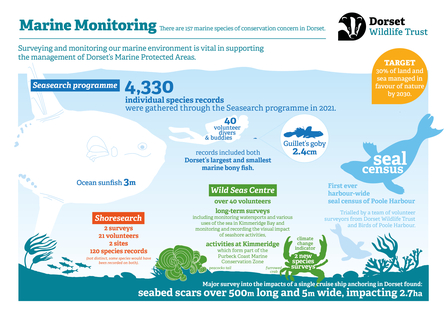Over fishing, pollution and marine litter, such as plastics, nurdles (raw plastic beads used by industry) and discarded fishing gear, all pose a threat to marine wildlife. Sadly, over the past couple of years, we have also seen huge quantities of personal protective items associated with Covid-19, finding their way into our rivers, estuaries and seas. Dorset is fortunate to have a rich and diverse coastal and marine environment. This diversity has been recognised with the designation of several Marine Protected Areas (MPAs) off the Dorset Coast.
Find out more about Dorset's MPAs
However, we must not take the quality of Dorset’s marine environment for granted. Many of the global threats to marine wildlife are present in Dorset seas. Well managed MPAs can help to protect the local inshore fishing industry, support tourism and recreation and also make a contribution to carbon capture and storage. For example, the UK has lost about 90% of our seagrass in the past 100 years or so. If we can enable seagrass to expand and flourish it has huge capacity for absorbing carbon and supports many species of fish and invertebrates including juvenile fish of important commercial species.


